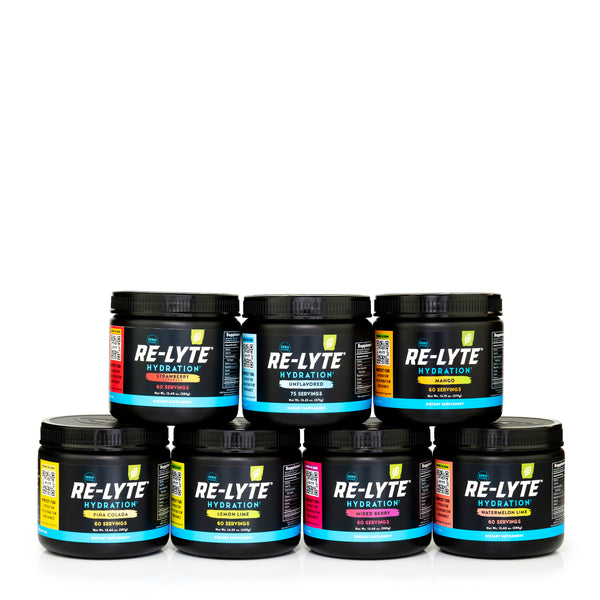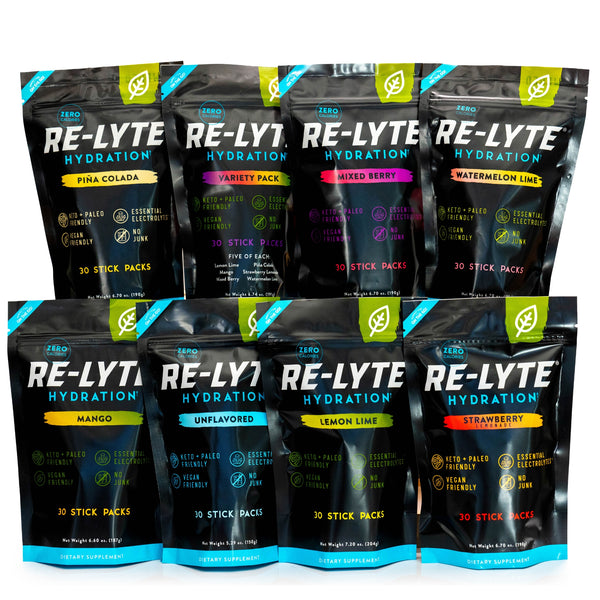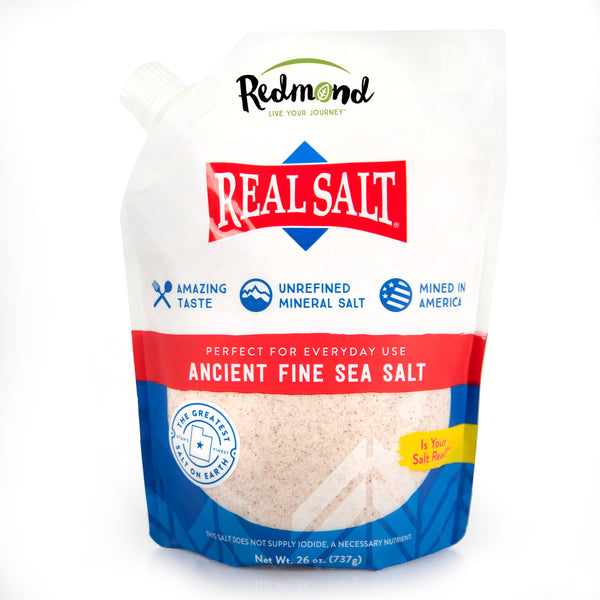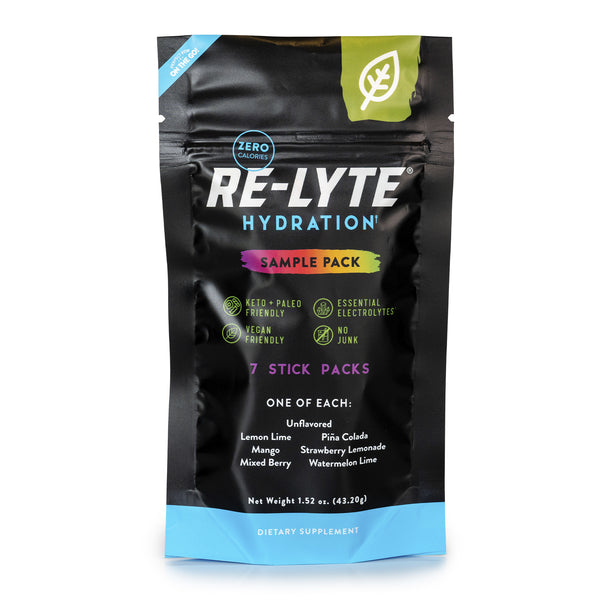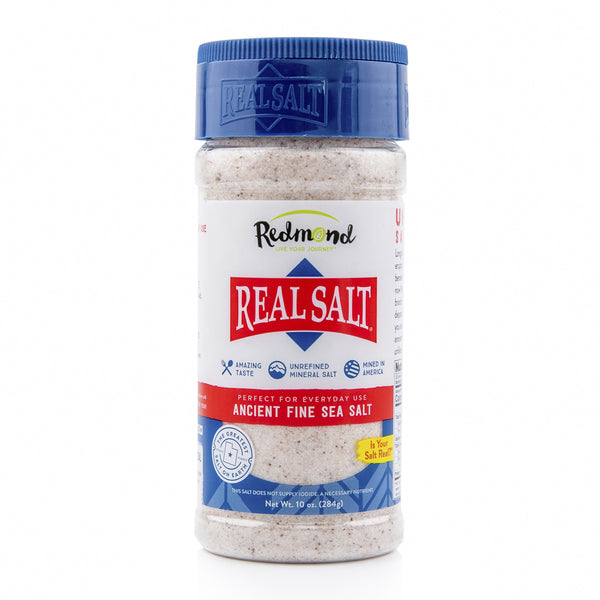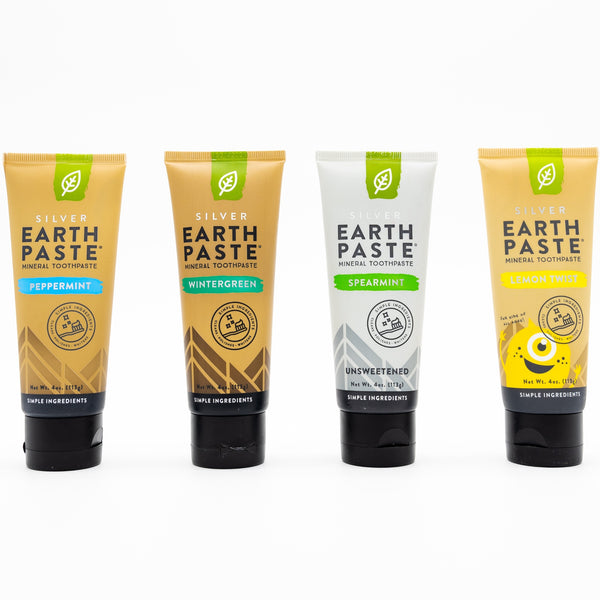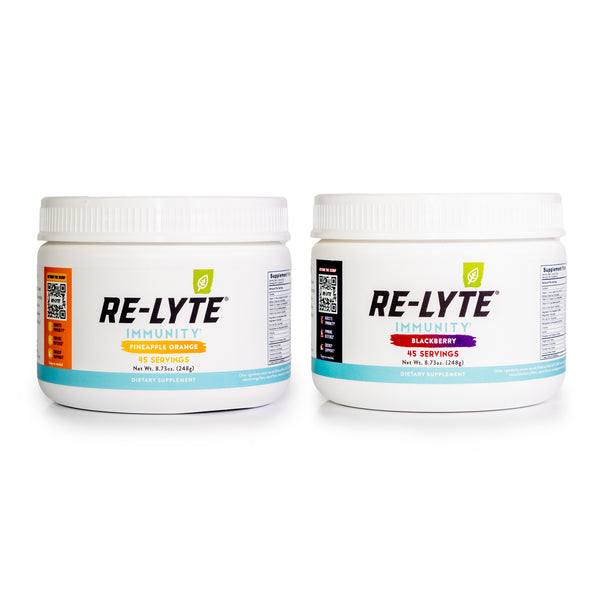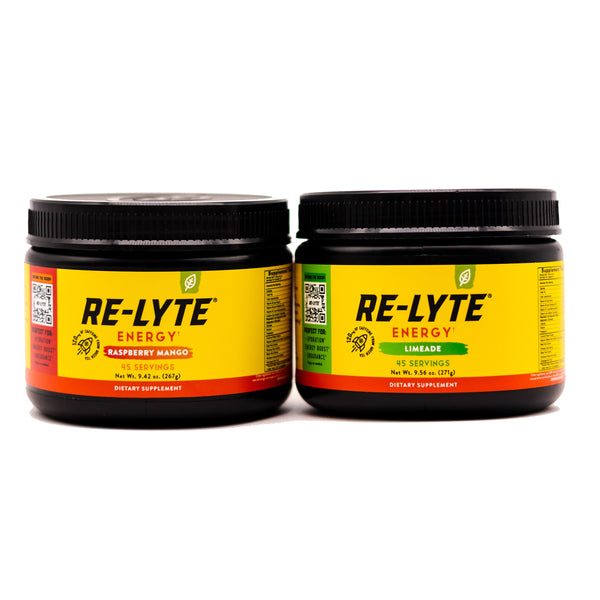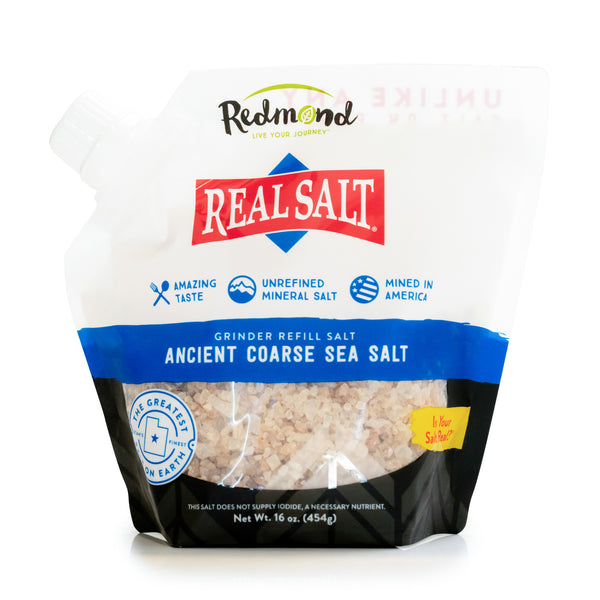Why Dehydration Makes Your Muscles Weaker (And the Hydration Plan That Helps)
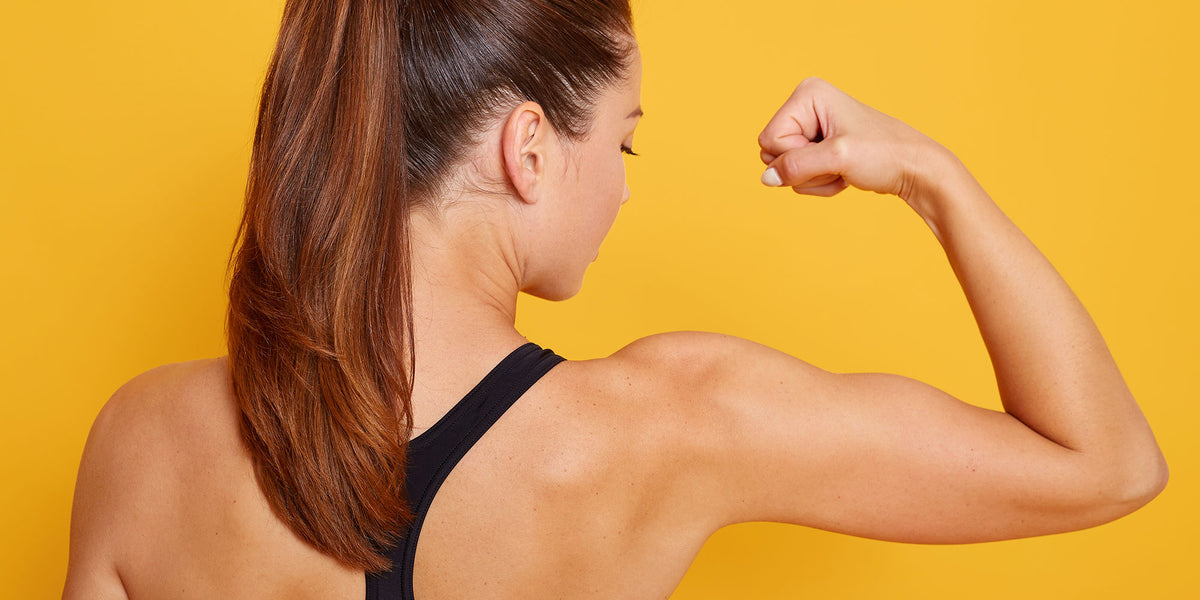
Article at a Glance:
- If you want strong, healthy muscles, hydration should be a top priority.
- Research shows that not being properly hydrated can limit muscle strength, power, and endurance.
- Dehydrated muscles are also more vulnerable to stress and strain, which means they’re much more easily injured.
- Dehydration prevents muscles from creating protein as efficiently, which means they can’t grow and repair themselves as well.
- If you train and sweat regularly, aim for 3.5-7 liters of total fluids per day along with plenty of electrolytes.
Some of us go to great lengths to give our muscle strength a boost. We choke down chalky protein powders, spend hours at the gym, and even try extreme supplements that promise to make us look like Arnold Schwarzenegger circa 1982.
But what if getting stronger, healthier muscles was easier than we made it out to be? What if all it took was a little extra H20 (with a healthy dose of electrolytes)?
Well, the truth is, it might be that simple. Research shows that dehydrated muscles struggle with strength, power, stamina, and more. So staying properly hydrated could give your muscles a better boost than some of those more complicated (and expensive) approaches you take.
Your Muscles Need Water (And Electrolytes)
Did you know that your muscles are made up of 79% water? This water (and the other water located throughout your body) affects how your muscles look, feel, and perform. In fact, a 2007 research review published in the journal Sports Medicine concluded that not being properly hydrated can limit muscle strength and power, as well as muscle endurance during high-intensity activities.
Why does hydration make such a difference in how well your muscles work?
Well, every time you flex or contract your muscles, they pull water from your blood to fill up the muscle tissue and cells. This allows them to do all that heavy lifting (or even light lifting) without getting tired or injured. But if there’s not enough water to go around, the opposite happens. Your body begins to pull water from your muscles and move it into the blood. It does this for a darn good reason—to keep your circulation and blood pressure functioning as they should. But this puts your muscles in a precarious position.
Without enough water to support them, your muscles get tight and cramp. Dehydrated muscles are also more vulnerable to stress and strain, which means they’re much more easily injured. One 2008 study concluded that even moderate dehydration (a 2.9% body mass decrease) is enough to make an athlete more susceptible to injury.
Water transports a variety of essential nutrients to your muscles too, including important electrolytes. Electrolyte levels have a direct impact on muscle function. They help regulate fluid levels in your muscle cells (and all cells). And they help trigger muscle contraction, a process your body needs to, you know, move (no big deal).
Electrolytes can also help normalize the pH of your muscles during exercise. You see, when you exercise, your muscles tear and repair themselves. During the repair process, they produce lactic acid. But that lactic acid makes your muscles more acidic, which makes them feel tired and sore. Electrolytes help get pH levels back on track and ward off this fatigue.
When your muscle cells don’t have enough water, it stops them from creating protein as efficiently too. Without enough protein, your muscles can’t grow and repair themselves as well. In fact, if they don’t have an ample supply of protein, muscles can begin to break down.
That may be why a 2001 study found that dehydration decreased the muscle strength of weight-training men. And why a 2008 study found that dehydration decreased both upper and lower body strength.
Another culprit behind poor muscle function during dehydrated states could be cortisol. A study from the University of Connecticut found that dehydrated athletes had increased cortisol levels. Cortisol competes with testosterone for some enzymatic receptors in your body. Testosterone is the most important hormone in muscle growth. So more cortisone could mean less testosterone and less muscle.
The take-home message? Your muscles need plenty of water and electrolytes to grow, stay strong, and perform at their best.
How to Stay Strong And Hydrated
So clearly, water (and electrolytes!) are where it’s at if you want strong muscles. Especially since research shows that more than 40 percent of the people heading to the gym for exercise class were unwittingly dehydrated. We can’t say for sure, but the same probably holds true for people heading to the weight room too.
That doesn’t mean you can’t use other methods to support your muscles. It just means you have to lay that healthy hydration foundation first. Because if you’re not staying well-hydrated, your muscles aren’t going to have strength or stamina no matter what else you do.
How much water do you need to keep those muscles happy?
That question can be hard to answer precisely because everyone’s needs are a little different. But scientists at the U.S. National Academies of Sciences, Engineering, and Medicine estimate that healthy men living in temperate climates need about 15.5 cups (3.7 liters) of fluids per day and healthy women living in temperate climates need about 11.5 cups (2.7 liters) of fluids per day.
If you’re someone who trains and sweats regularly, you’ll want to aim for closer to 14-29 cups (3.5-7 liters) of fluids per day. That includes the fluids you get from food and other beverages throughout the day (so you don’t need to be downing that much water every day). And don’t forget to think about personal factors that affect your fluid needs as well, like health conditions, heat waves, pregnancy, and nursing.
But what about the other half of the hydration equation— electrolytes?
Well, you get some electrolytes from your diet, especially if you include plenty of electrolyte-rich foods like coconut water, bananas, cheese, chicken, turkey, avocados, pomegranate juice, and watermelon. But research shows that many active, athletic people don’t get enough electrolytes in their diet to replace what they lose in sweat.
So if you really want to guarantee you’re getting all the electrolytes your muscles need to stay strong when you sweat, you’ll want to consider electrolyte drinks or supplements.
The Easy Way to Hydrate Your Muscles
There are a variety of products in our Re-Lyte line that deliver the clean electrolytes your muscles need to thrive ….and more.
Re-Lyte Pre-Workout Mix is perfect for you if you’re looking for a way to support your muscles and give yourself a motivating boost before every workout. It contains a generous dose of essential electrolytes, muscle-supporting amino acids, caffeine, and other ingredients that can help your crush every workout.
If you'd rather pop a pill than drink a mix, our Re-Lyte Muscle Recovery Capsules are an awesome choice. They contain essential electrolytes that provide optimum hydration, vegan BCAAs that promote muscle repair, and turmeric root that supports healthy inflammation levels.
Re-Lyte Hydration is also a fantastic option for anyone who wants to stay hydrated but isn’t interested in the caffeine and other ingredients in Re-Lyte Pre-Workout or Muscle Recovery Caps.
Bottom line? If you want to keep your magnificent muscles strong and happy, do your research and pick a healthy hydration option that works for you.
Sources:
- The Water in You: Water and the Human Body— United States Geological Survey.
- Hydration and muscular performance: does fluid balance affect strength, power and high-intensity endurance?— Sports Medicine.
- Electrolytes and Exercise: Keeping Your Body Balanced— International Sports Sciences Association.
- Electrolytes and their relationship to normal and abnormal muscle function— Orthopedic Nursing.
- Effects of changes in water compartments on physiology and metabolism— European Journal of Clinical Nutrition.
- Active dehydration impairs upper and lower body anaerobic muscular power— Journal of Strength and Conditioning Research.
- Effects of dehydration and rehydration on the one-repetition maximum bench press of weight-trained males— Journal of Strength and Conditioning Research.
- The Effects of Hydration on Athletic Performance— Sports Cardiology BC.
- Your Muscles Are Thirsty: Here's Why— Bodybuilding.com.
- H2Grow: Water – Your Secret Weapon & Why It’s The Most Important Element Of Them All— SimplyShredded.com.
8 foods and drinks to help replenish electrolytes— Insider.com.




